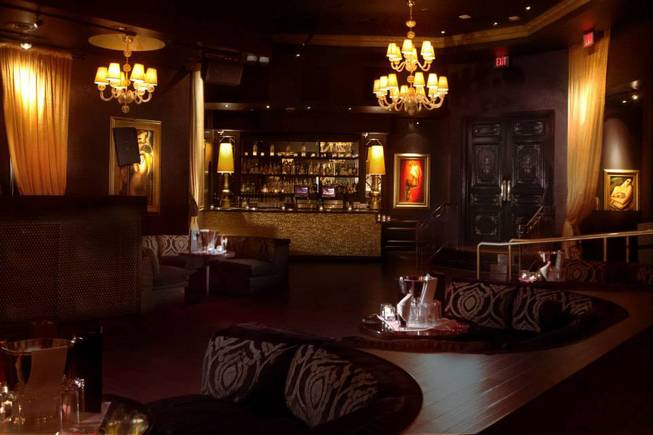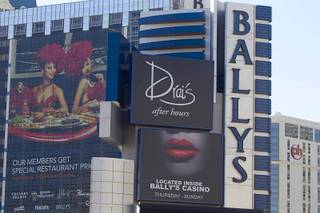
Carlos Larios
Drai’s nightclub at Bally’s on the Las Vegas Strip. One person was killed and two others wounded in a shooting at the club early Monday, Oct. 21, 2013.
Tuesday, Oct. 22, 2013 | 1 a.m.
Related news
Police are calling Monday’s fatal shooting at Drai’s After Hours nightclub at Bally’s that left one dead and two wounded an isolated incident. But the discreet and often nebulous security policies behind Las Vegas nightclubs mean that bringing weapons onto Strip properties, even when they’re forbidden, isn’t always difficult for those who try.
Like every nightclub on the Strip, the chic decor of Drai’s is unblemished by boxy metal detectors, its patrons untouched by pat-downs from security guards as they wait to get in, greeted instead by doting hosts who welcome guests into the plush lounge for an evening of escape.
Over the past 15 years, Drai’s — which has temporarily relocated to Bally’s during the renovation of Bill’s Gamblin’ Hall & Saloon — has cemented itself as a Strip staple, providing a reliable till-dawn destination for both resilient clubgoers and the local industry crowd leaving their graveyard shifts at other bars and clubs that typically close around 3 or 4 a.m.
Drai’s, which plays hip-hop and house music and has a successful counterpart in Hollywood, has developed a more low-key, less glamorous reputation than some of its peers, but until Monday had no history of violent altercations, according to Metro.
In the wake of Monday’s pre-dawn shooting, nightclub operators and casinos alike have been reluctant to discuss what measures are in place to prevent dangerous weapons from entering their premises.
Security experts say current practices leave nightlife venues, particularly nightclubs, vulnerable to worst-case scenarios like the one that unfolded at Drai’s.
“They’re not doing pat-downs at the door,” said Robert Smith, CEO of San Diego-based Nightclub Security Consultants Inc. “One in 20 does that.”
•••
When it comes to nightclub security, Frank DiCerbo carries an old-school mentality: more guards, less trouble.
But what worked in the early '90s, when he served as the Tropicana’s director of security for more than a decade, isn’t a sure sign of what works inside the nightclubs of today.
“Today’s environment is much different,” said DiCerbo, the 59-year-old owner of Templar Security & Protective Services, a private security firm in Las Vegas that works the doors for special events and small clubs. “These hoodlums don’t respect human life.”
But the security scheme of most modern nightclubs doesn’t help much either, according to other security consultants.
Legally, residents with concealed firearm permits can carry licensed weapons to Strip venues, though each property reserves and will usually enact the right to restrict entrance to those individuals. However, patrons are only explicitly screened for weapons at sports and concert arenas with built-in security checkpoints.
Nightclubs and dayclubs will ask to examine patrons purses and other personal effects to check for narcotics, and many smaller clubs have a “pat down” policy and use elongated metal detectors called “wands” to search guests for knives or guns. But while most club policies prohibit firearms in the building, the most glamorous clubs in Las Vegas don’t bother to check, Smith said.
Why? Because the last thing a big spender wants before getting the top bottle service is to deal with a big touchy bouncer — a fact casino and nightclub operators are increasingly sensitive to, given an uptick in recent years of customer assault and battery lawsuits against property security at venues across the Strip.
The nicer the club, the easier the access for guests with enough cash to pay the cover charge, which could be as much as a $100 depending on the night and entertainment. So if a patron visits a high-end nightclub with a gun in his waistband, and security doesn’t see it, he won’t have much trouble getting his weapon on the dance floor if he has the dough to get through the front door.
Club security often comes down to visual observation and discretion of the security team, says a host for several of the Strip’s major nightclubs, who asked to remain anonymous because he was not authorized to speak about the clubs’ security policies. While celebrities with their own bodyguards would likely be permitted to bring guns inside a nightclub, a patron seen brandishing a firearm or simply carrying one while alcohol is being served would not likely be allowed in or would be asked to leave.
DiCerbo’s company has been hired to pat down and check guests for dangerous weapons, but he hasn’t done any work for the major nightclubs in town.
When he worked at the Tropicana, he held onto the guns of prominent rapper Snoop Dogg’s entourage. He didn’t know Snoop that well, but DiCerbo said he knew the rapper had no intentions of starting trouble. “The bad guys?” DiCerbo said. “ They’re not going to give up their weapons.”
Nightclub groups, like the Light Group, which operates four clubs in town, generally have their own in-house security staff with specific security procedures in place for each club.
A spokesperson for Tao Group, which operates clubs including Marquee at the Cosmopolitan and Tao at the Venetian, declined to comment on specific security practices “in order to protect the effectiveness of our security procedures,” but stated that “security is a very important component of our club operations and we regularly evaluate our training and procedures to make certain they meet the highest of standards.”
DiCerbo said many on-site security teams are trained to diffuse situations using “verbal judo.”
“A majority of clubs train their staff, but they don’t train them job-specific needs,” Smith said.
It’s a system that’s nonetheless worked effectively since the rise of the Las Vegas nightclub scene over the last decade. Despite the millions of visitors flocking to Strip nightclubs each year, very few violent incidents -- particularly those involving weapons -- have been reported.
But in the case of the shooting at Drai’s, both Smith and DiCerbo agree: Sometimes there’s no way for a security staff to prevent a shooting, especially if a guest intends to hurt someone when he pulls out the gun.
“You could have all the training in the world,” said Smith, who has served as a security consultant for Spearmint Rhino, “but sometimes no amount of training, no amount of guards, no amount of education will stop a shooting.”
DiCerbo was the security boss in February 1998, when one of his guards was shot and killed at the Tropicana by a man who had been thrown out for starting a brawl at a dance party.
Jose F. Martin, who later pleaded guilty to first-degree murder and is now serving time in prison, put several bullets in the back of 44-year-old Elroy Arokium, who died in the shooting.
Martin said he was angered by the security staff for throwing him out and returned with the gun to get even. Arokium was not involved in the fight Martin started earlier in the night.
It’s an incident DiCerbo said he never got over.
Monday’s shooting is the latest in a string of at least four gun-related incidents on the Strip in the past year, including a deadly shooting and car crash on Las Vegas Boulevard in February that stemmed from an altercation inside Haze nightclub at Aria.
Despite the seeming influx of gun violence on the famous tourist corridor, Metro Sheriff Doug Gillespie was quick to assert that Monday’s shooting was a “random act” that is not indicative of increased violence on the Strip.
“These two incidents I would not classify as a trend. But any time you have an incident like this ... We take it very, very seriously,” Gillespie said at a Monday afternoon news conference at Metro headquarters.
When asked whether this year’s deadly nightclub-related incidents might result in further action by Metro or changes to nightclub security policies across the Strip, Gillespie said, “It’s an ongoing process in regards to security in and around the hotel properties as well as the nightclubs. This is an event that I’m sure will develop continued dialogue in regards to keeping Las Vegas a safe tourist destination.”
Police are reviewing surveillance video and investigating whether Frazier was able to carry a concealed weapon and, if not, where he acquired the handgun.
Sun reporters Jackie Valley and John Katsilometes contributed to this report.


Join the Discussion:
Check this out for a full explanation of our conversion to the LiveFyre commenting system and instructions on how to sign up for an account.
Full comments policy